- Home
- Jerry Spinelli
Dead Wednesday Page 2
Dead Wednesday Read online
Page 2
The bus stops for kid number two: Stephanie Win. His four minutes are over.
Seven more stops, and now…
7:57 a.m.
…Forrest Avenue.
No stop. No slowing down. No pointing. No indication that anyone realizes what a special line they are crossing. But Worm knows. Forrest Avenue is the northern boundary of Amber Springs.
Town.
Every day the street sign reminds him how badly he wants to live on the other side of Forrest. In town. Civilization. At every stop from now on, he will envy the kids who board the bus. They don’t know how lucky they are.
Up and down the bus you can tell the eighth graders at a glance: no backpacks. No need for them today.
A muted ping in his pocket. What did he expect—his mom would give up? Worm sticks his tongue out and quickly withdraws it. It’s an embarrassing leftover habit from his little-kid days. Worm was one of the last boys in his grade to get the low voice. He likes girls, but unlike Eddie and other hunks and Romeos, he has had no real experience with them. He knows he trails the pack in the maturity race. He also knows that’s one reason why he likes to hang with Eddie. With Eddie he feels a little older, a little more manly, than when he’s alone.
8:01 a.m.
At Noble Street a skeleton gets on. Walks the full length of the bus for max exposure.
It’s David Ott. Nobody else would wear a skeleton suit for Dead Wed.
Guys along the aisle fist-bump him, say stuff:
“Otter.”
“Yo, Otter.”
“Killin’ it, man.”
The skeleton is cool, slow, doesn’t speak. The girls are going bananas. Meanwhile, the bus is grumbling at idle, waiting for the skeleton to sit. And now some girls pop up, chanting, “Ot-ter! Ot-ter!” Laughing, cheering, even a whistle. Which makes the ever-grouchy driver swing around, point, growl: “Down! Sit! Now!”
It occurs to Worm to call out: Skeletons don’t need to sit! But he doesn’t. He thinks a lot of things he doesn’t say. Shy. His tag. Never got to “I’m a Big Teapot.” By now his old nickname and more recent tag have publicly merged: Worm. Shy. For the most part it discourages people from trying to lure him from the sidelines to join the scrum. Don’t ask Worm. He’s shy.
Skeleton passing, fist bump:
“Worm.”
“Otter.”
The skeleton takes a seat in the back. Worm wonders how long Otter will get away with it. The bus lurches.
Next stop: Monica Biddle. She always sits in a front seat. She never looks at him. It wasn’t always that way. She used to sit toward the back, a couple of seats in front of Worm. Then one morning last year, in seventh grade, she paused before sitting down and stared directly into his eyes and said, loud enough for others to hear, “Get a life, Worm.”
Since then he’s been trying to figure it out. Why did she say it? What did he do?
After a year he’s come up with a guess: she said it because, as Shy Worm, he may in fact appear to have no life. Which doesn’t mean Monica Biddle should announce it to the universe. Every day when she boards the bus, he wants to scream at her: I do have a life! You just can’t see it!
One of the things she can’t see is his favorite daydream, which features himself—as a real worm—crawling up her nose, preferably at dinnertime in front of her horrified parents.
Ah…Eddie’s stop.
8:09 a.m.
Eddie’s on, heading down the aisle. The world is right again.
Worm stares out the window, doesn’t look at Eddie. He’s always careful not to show how thrilled he is to see his best pal. Feeling Eddie sit beside him, he swings his right arm, offers his fist, feels the bump.
“Yo.”
“Yo.”
Eddie settles in, and first thing, sure enough, he says, “Pathetic.”
It’s Eddie’s signature word: pathetic. Worm hears him use it at least a couple of times a day. It’s become a handy way for Worm to evaluate his environment, to learn what’s cool and what’s not. When Eddie pronounces something or someone “pathetic,” another pixel in Worm’s world goes to high-def.
Worm immediately seeks the target of Eddie’s eyes. It’s a kid just now bumbling late onto the bus. As the kid wobbles down the aisle, Worm studies him…why the “pathetic”?…Ah, now he sees it: the belt. The kid, no doubt a sixth grader who doesn’t know any better, is wearing a belt that belongs in either a museum or a dumpster. It’s covered in little beads: black for the background and clusters of orange beads that form a parade of jack-o’-lanterns around his waist. Breaking news, runt: Halloween is four months away.
Eddie often gives sixth graders a pass, but Worm understands why this cannot be overlooked. The kid finds a seat, totally unaware that he’s been defined and boxed by the captain of the bus. Worm loves being on the good side of “pathetic.”
One thing about shy (Worm) and cool (Eddie): the inside stuff may be different, but to others they probably look pretty much the same. Worm knows he’ll never be cool. He’s just glad to get splashed by some of Eddie’s cool.
Sometimes he still can’t believe it: him and Eddie. Best buds. Besides cool, Eddie is everything else Worm is not: great-looking, popular, athletic, a leader. The skin on his face is smooth as an M&M. He probably doesn’t even know what Clearasil is. Girls love him and, in their own way, so do guys. And yet—Worm still can’t believe it—they’re best friends. Every once in a while he’ll hear somebody say, “Eddie and Worm…,” and he feels all cotton candy inside.
Every day when Eddie plops down next to him on the bus, he wants to yell up the aisle: Hey, Mean Monica! Look who Eddie Fusco’s sitting next to! Loser!
When Eddie speaks again, it is, again, one word: “Fight.”
Worm turns to him, grins. “Twelve-thirty.”
Eddie’s response is to punch the seat back in front of him. Jolted, the kid in the seat barks, “Hey!” and turns. When he sees it’s Eddie Fusco, he laughs and shoots a thumbs-up. “Hey, Eddie.”
“So,” says Worm, “who do you think, Jeep or Snake?”
Eddie mulls it over. “Hard to say. They’re both nasty. Better be an ambulance ready.”
“Think girls’ll come?”
Eddie snorts. “Girls? How about teachers?”
They fist-bump.
“And then what?” says Worm.
“What when?” says Eddie.
“After the fight. What’re we gonna do then?”
Eddie nods. “Gotta make it count.” The free day, he means.
“Gotta,” says Worm.
“I’ll think about it.”
“Cool,” says Worm.
Worm considers the amazingness of it all. “Dead Wed, man.”
Eddie makes his hands like a prayer, looks up at the ceiling of the bus. “Thank you, Wrappers.”
That’s what they call the kids whose deaths make this a holiday for eighth graders every year. It comes from newspaper descriptions of teenage drivers zooming around curves at night and sailing off the road and wrapping their cars and themselves and their passengers around telephone poles or trees. Car accidents in particular and deaths in general come in many other ways, but the tag has stuck, and good luck now trying to pry it off. Wrappers.
Hearing Eddie say this, Worm feels better about silently thanking the Wrappers earlier. In fact, he figures the backpackless eighth graders up and down the bus are all thinking the same thing: Thank you, Wrappers. Like, c’mon, who doesn’t secretly want to jump on a teacher’s desk and detonate a rocket blastoff fart or two? The point is being allowed to. Even if you really wouldn’t.
Worm is feeling it: his best pal beside him…fight at the cannon…Dead Wed. It comes to him that the full force of becoming a teenager did not hit him on his recent fourteenth birthday, but today, now.
He doesn’t think the words, they simply pop out: “Perfect day.”
At first it seems Eddie doesn’t hear him. Now suddenly, in a way only Eddie can do, he bolts up from his seat, throws out his arms like Moses parting the Red Sea, and bellows: “PERFECT DAY!”
The bus erupts. Cheers, whistles. Sixth and seventh graders drop their guard and frolic, tasting eighth grade. The skeleton and a dozen kids jive-rock up and down the aisle. They all fall laughing as the bus lurches to a stop, the driver roaring, “Seats! Now! Delinquents!”
Worm watches, soaks in the honor of being the one who started it all. Eddie took what he said and turned it into magic. Thanks to Worm, the bus driver called them all “delinquents.”
Laughing collapsers are crawling to their seats. The cell pings in his pocket. Text. He reads it. Stuffs the cell. His mood sours. “My mother wants me to come right home.”
Eddie looks like he’s been whacked in the head. He blinks. “Huh? When?”
“Right after. She says take the bus.”
On this day every year several buses show up at the end of fourth period, ready to transport freedom-drunk eighth graders home. This year the buses will be running mostly empty. This year kids will be heading for the fight at the cannon.
Eddie’s face shows he still doesn’t get it. “The fight,” he says.
“Don’t worry,” he tells Eddie. “I ain’t doing it.” His pocket pings again. He ignores it. “I told her no.”
And gets a look from Eddie—an I’m proud of you, dude look, a grin, a nod, as if something he’s always suspected has been confirmed. Eddie offers his fist, they bump. “My man,” Eddie says.
8:16 a.m.
Last stop: Beautiful Bijou Newton gets on.
She’s the girl version of Eddie. Perfect. As she steps up and into the bus, a bolt of electricity flies down the aisle. Her time on-bus is a tragically brief four minutes. But there’s a blessed upside. In a rare example of boy-girl cooperation, the riders conspire to make sure the one remaining empty seat is always in the back row. Any one of the four will do. What this does is compel Beautiful to walk the entire length of the bus.
The main object, of course, is to give every eyeball a chance to feast up close. But her perfection is more than skin-deep. She’s just too darn nice to be jealous of. She’s anything but snooty. When the subject of her looks is forced upon her, she does the finger-in-mouth gag thing and mocks herself: “Beautiful schmootiful. You should see me in the morning. You’d call the dogcatcher!” Which only makes her more lovable.
On this Wednesday, like every school day, Beautiful Bijou dispenses hi’s and smiles as she glides down the runway.
After she passes them, Eddie leans into Worm and whispers: “She dumped the Hulk.”
Worm boggles. “When?”
“Yesterday. After school.”
“Whoa.”
News does not get bigger than this. Hulk Abernathy, a junior-year all-state tackle in high school, has been going with Beautiful since before Christmas. Two weeks ago they were the centerpiece of the eighth-grade prom. (Or so Worm has heard.) No middle schooler has ever dared to make a move on her. Not even Eddie Fusco.
Normally, Worm would safely process this breaking news from his place on the sideline, but something has happened today that has never happened before. As Beautiful approached them on her walk down the aisle, her smile—usually a sweeping, one-size-fits-all greeting—came briefly to a halt and landed somewhere. Worm will later realize that the landing must have lasted only a moment. But for now it seems to him that time has stopped, and the smile is like a painting forever hanging on a wall. And the reason the whole thing strikes Worm this way is because—contrary to everything he knows about how the universe works—the landing place of Beautiful Bijou’s smile seems to have been…himself.
8:20 a.m.
Into the school driveway. Backpacks climb onto shoulders like pet monkeys. When the kids are bad, like today, the grumpy driver keeps the door shut, punishing them. Within seconds, forty-four kids are crammed into the front half of the aisle. Worm thinks he feels Beautiful Bijou somewhere behind him. Suddenly the door opens. Kids gush out. Worm wants to turn and spot her getting off, but he can’t make himself do it.
The mob pours through the school door, but unlike any other day, they don’t scatter to homerooms. They’re pooled just inside, waiting to see what happens with the skeleton.
Otter doesn’t even make it through the door. Mr. Krebs, the vice principal, blocks him and utters a single word: “Off.”
A cloudburst of boos as Otter peels off his mask and now the Halloween costume. For a second Worm thinks Otter might be wearing nothing underneath but Fruit of the Looms, which would be historic. But it’s only regular clothes. An arms-up Rocky move from the former skeleton and the boos change to cheers, and David Ott leads the student body on to school.
8:23 a.m.
The doorway is empty.
Every day for three years Mrs. Truitt has been stationed at the Homeroom 113 doorway, smiling, greeting everyone by name: “Good morning, Sarah….Good morning, Leah….Good morning, Robbie….”
Not today.
Today Mrs. Truitt is standing at the far side of the room, looking out the window, her hands behind her back, her back to the class.
Like we’re not here, thinks Worm.
A glance to the right and there they are, covering the blackboard and spilling over onto the wall: the Wrappers. Poster-size pictures. Faces. Teenagers. Some in color, some black-and-white. This must be new. He’s heard of the cards before, but not the poster pictures.
When you’re a kid around here, practically from the time you’re a baby, you hear about Dead Wednesday and the Wrappers. At first you’re clueless and curious. Then for a couple of years you grim down to its solemn message. Then you look forward to it because by now you’re sick of being a little kid, and Dead Wed is, as much as anything, your official ticket to big-kidhood. And finally you crave it as much as your favorite junk food, because now you understand what Dead Wednesday really, really means: a half day of fun at—of all places—school!
And now that it’s actually here, there’s a sense of unreality about the whole thing, like that time they had the bomb scare. And something else, something Worm has no name for, something about the teacher’s back…the kids quiet instead of chattery and rowdy…the faces on the blackboard…
Ping.
His mother never texts him at school. He better check it.
Daisy Chimes is coming!!!
You MUST be here!!!
He pockets the cell.
And now he notices the inner frame of the doorway. It’s draped in black crepe paper.
Room 113 is filled with people but feels empty. Just faces in the seats facing faces on the blackboard.
Worm wonders: When does the fun start? He wonders how all this is sitting with Eddie. Hah—dumb question. Eddie is cool with everything.
Worm pulls up the Smile on the little screen behind his eyes. But it won’t stay in focus; the faces on the blackboard keep getting in the way. He counts them. There are twenty-three. Same as the number of eighth graders in Homeroom 113.
And who is Daisy Chimes?
Dead Wednesday
It began in the old days. Somebody’s tenth grader took three friends joyriding at 100 mph around the Eagle Mountain curve and smack into an evergreen. Closed caskets for all four.
So they decided that the kids of Amber Springs needed a big-time warning before plunging into the evils of young adulthood.
Before sinking out of reach.
Before high school.
The way it goes, on the second Wednesday in June every eighth grader gets a card with the name of some kid from Pennsylvania who died during the past year. The deaths have to be from something “preventable.” D
rugs. Alcohol. DAT (driving and texting). MOWD (making out while driving). Recklessness. Unavoidable accidents don’t count. Fatal illness doesn’t count.
You get something besides the card. You get a black shirt. From the moment you put on the black shirt, it’s like you’re not yourself, you’re the name on the card. You’re that kid. You’re dead. Teachers don’t see you. That’s why you can do anything you want.
You’re known as a Deader.
But it doesn’t stop there. Every household and business in Amber Springs has gotten a flyer in the mailbox explaining Dead Wednesday and asking for cooperation “for the precious futures of our young people.” Posters proclaim it from telephone poles and storefront windows along Pocono Street. The “dead” are supposed to wear their black shirts until they go to bed that night.
A surprising number of townspeople go along with it. Walk up to the window at Homer’s Water Ice in a black shirt and you might not get served. There are even radical parents who refuse to speak to their kids, even at the dinner table. Worm’s mother wasn’t lying.
The eighth graders themselves? Sure, some of them are serious. You can see the scared in their eyes. But it’s the jokers who steal the show. For Worm, Dead Wed in sixth and seventh grade meant a front-row seat at a circus or comedy club. Farting and belching up and down the hallways. Eighth graders walking out of a room halfway through class. Or walking clear out of school, usually to return because it’s too much fun inside.
Underclassmen have to mind their shoes around water fountains; it’s become practically a sacred duty of Deaders when they take a drink at a fountain to spit it out on the floor. It’s become a tradition for the class clown to do something really special. Worm wonders what Otter has in mind.

 Who Put That Hair in My Toothbrush?
Who Put That Hair in My Toothbrush? Stargirl
Stargirl Loser
Loser Jake and Lily
Jake and Lily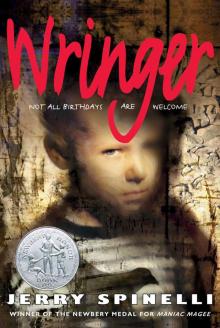 Wringer
Wringer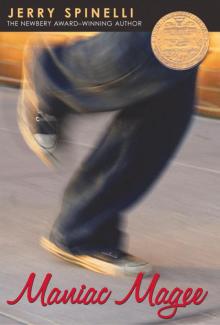 Maniac Magee
Maniac Magee Smiles to Go
Smiles to Go Love, Stargirl
Love, Stargirl Hokey Pokey
Hokey Pokey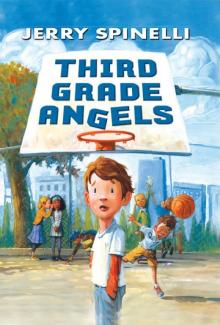 Third Grade Angels
Third Grade Angels Tooter Pepperday: A Tooter Tale
Tooter Pepperday: A Tooter Tale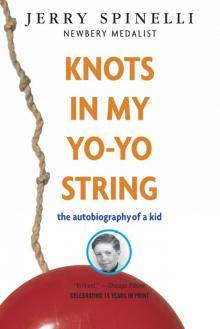 Knots in My Yo-Yo String Knots in My Yo-Yo String
Knots in My Yo-Yo String Knots in My Yo-Yo String Blue Ribbon Blues: A Tooter Tale
Blue Ribbon Blues: A Tooter Tale The Bathwater Gang
The Bathwater Gang Crash
Crash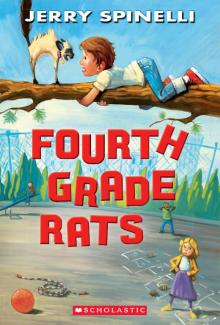 Fourth Grade Rats
Fourth Grade Rats Eggs
Eggs Blue Ribbon Blues
Blue Ribbon Blues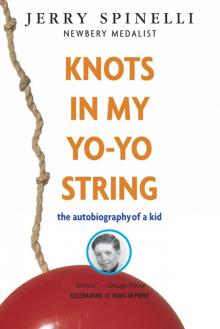 Knots in My Yo-Yo String
Knots in My Yo-Yo String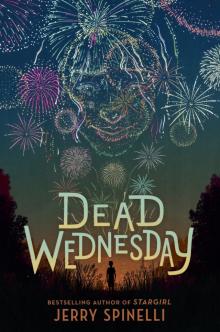 Dead Wednesday
Dead Wednesday Tooter Pepperday
Tooter Pepperday